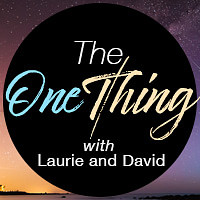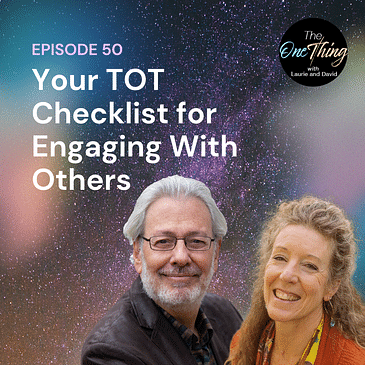What we cover:
- A checklist of the qualities that TOT-connected conversations have
- Vapor trails that are clues alerting you to when you've disconnected from TOT while interacting
- A remarkably simple tool for rapidly restoring TOT connection when you discover that you've disconnected
=> Here's the link to Laurie's Free 5-Day Video Course that she mentioned: www.SacredHealthAcademy.com/Kickstart-Your-Energy-5-Day-Reset-e
=> David mentioned his keynotes and training programs on "How to Have Difficult Discussions About Touchy Topics in Transformative Ways." To explore the possibility of having him give one for your organization or event, contact him via his main website: www.DrGruder.com.
What we mean by The One Thing (TOT) is our connection to the higher self part of our True Self Anatomy. People call TOT by various different names, such as but not at all limited to Source, Spirit, God, the wisdom of the universe, our higher self, and so forth. The time has come to stop viewing life problems as things we can solve separately from TOT. Doing this is The One Thing that individuals, communities and countries have yet to try en masse. Solutions Start With Source™.
The One Thing podcast helps you more fully establish, and constantly return to, TOT connection -- moment-to-moment -- as the first step in dealing with what life brings to us. In each episode your co-hosts, Laurie Morse and David Gruder, offer you ways to understand and more effectively deal moment-to-moment with a specific personal, societal, and global issue, so you more effectively do your part to help usher in the era of Homo Spiritus: Humans being conduits for higher love and wisdom in the physical universe.
Please share your comments, questions, requests for future episode topics, and any other feedback you might have, through the Contact page on our podcast site: TOTpodcast.net
The One Thing podcast helps you more fully establish, and constantly return to, TOT connection -- moment-to-moment -- as the first step in dealing with what life brings to us. In each episode your co-hosts, Laurie Morse and David Gruder, offer you ways to understand and more effectively deal moment-to-moment with a specific personal, societal, and global issue, so you more effectively do your part to help usher in the era of Homo Spiritus: Humans being conduits for higher love and wisdom in the physical universe.
Please share your comments, questions, requests for future episode topics, and any other feedback you might have, through the Contact page on our podcast site: TOTpodcast.net
The One Thing podcast from Laurie Morse and David Gruder covers a wide range of topics about elevating our individual and collective connection to the higher self part of our True Self Anatomy. Your comments, questions, episode topic requests, and general feedback are welcome at https://TOTpodcast.net!
Powered By Podcastpage.io



